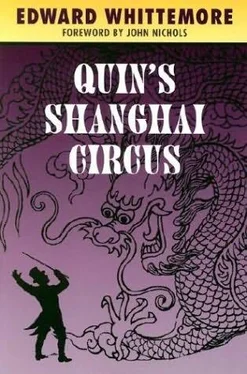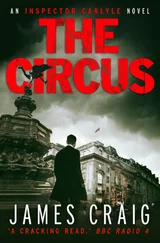Edward Whittemore - Quin’s Shanghai Circus
Здесь есть возможность читать онлайн «Edward Whittemore - Quin’s Shanghai Circus» весь текст электронной книги совершенно бесплатно (целиком полную версию без сокращений). В некоторых случаях можно слушать аудио, скачать через торрент в формате fb2 и присутствует краткое содержание. Жанр: Фэнтези, на английском языке. Описание произведения, (предисловие) а так же отзывы посетителей доступны на портале библиотеки ЛибКат.
- Название:Quin’s Shanghai Circus
- Автор:
- Жанр:
- Год:неизвестен
- ISBN:нет данных
- Рейтинг книги:3 / 5. Голосов: 1
-
Избранное:Добавить в избранное
- Отзывы:
-
Ваша оценка:
- 60
- 1
- 2
- 3
- 4
- 5
Quin’s Shanghai Circus: краткое содержание, описание и аннотация
Предлагаем к чтению аннотацию, описание, краткое содержание или предисловие (зависит от того, что написал сам автор книги «Quin’s Shanghai Circus»). Если вы не нашли необходимую информацию о книге — напишите в комментариях, мы постараемся отыскать её.
Quin’s Shanghai Circus — читать онлайн бесплатно полную книгу (весь текст) целиком
Ниже представлен текст книги, разбитый по страницам. Система сохранения места последней прочитанной страницы, позволяет с удобством читать онлайн бесплатно книгу «Quin’s Shanghai Circus», без необходимости каждый раз заново искать на чём Вы остановились. Поставьте закладку, и сможете в любой момент перейти на страницу, на которой закончили чтение.
Интервал:
Закладка:
The Amanita muscaria was a mushroom as well known to Siberian peasants as it was to peasants in the Tohoku. When eaten, a cold sweat was followed by stupor, convulsions, delirium. Death’s angel it was called, because its victims were always young children who had not yet learned to recognize the deadly muscarine.
The policeman watched the guards die and found himself falling under a magical spell, perhaps because eight fates were dying in the pine grove and eight times eight was the number of paths that led to the primeval Oriental hexagram, the ancient figure found in the Book of Changes.
In any case the sky was so clear that night that every eye in the unfathomable darkness could look down upon this little creature who had come to take part, briefly, in a faceless, patternlesss drama that was without beginning or end, who had come to creep with chance through scenery as impenetrable as millennia of fallen pine needles, a creature who understood as much of the winds that moved him as a leaf broken from the branch of a mulberry tree.
The prisoner-of-war ship arrived in Yokohama in the spring of 1948. The cherry blossoms were still in bloom. A Japanese government band played the Washington Post March and Stars and Stripes Forever . Hundreds of mothers and sisters crowded the pier waving white handkerchiefs, trying to hear the chant from the men at the railings. What were they shouting? Banzai three times with the arms raised?
The chant grew louder as the ship moved in. They could hear it more clearly now.
Pulverize. Smash. Crush. Exterminate.
The handkerchiefs dropped out of the air, the families were quiet and uneasy. Down came the gangplanks and the men, but none of them stopped to embrace their wives and mothers and sisters. Instead they set up folding camp stools, climbed on top of the stools, and began shouting out interminable lectures on mad dog revanchists and imperialist jackals. The families surged hysterically up and down the pier losing themselves in the confusion.
The policeman pushed his way through the crowds and took a train to the industrial suburb where he had been given an underground assignment by the party. Ostensibly he worked in a factory owned by a secret party member that made novelties for export. He painted souvenir models of the Empire State Building. But his real job was to stand in the front line during antigovernment demonstrations and use a straight razor rolled up in a newspaper to slash the flanks of horses used by the police in controlling riots.
He also used the disguised razor to slash the faces of policemen who were on the ground. This routine continued for several years until war broke out in Korea. That May Day the party issued different orders. Not only were they to attack the police, they were also directed to burn the cars of Americans and steal revolvers from policemen where possible.
Razors. Fires. Clubbings. By ten o’clock in the morning he had his first revolver, by noon he had his third. Toward early evening he had cached several more. His procedure was to stagger out of an alley when a policeman passed and yell that he was being attacked by Communists. When the policeman went into the alley he hit him over the head with his blackjack and stole his revolver, then hurriedly worked over his face with the razor before going off to burn another car.
When the sun went down he found himself sitting in the cellar where the revolvers were hidden. He was tired. He counted and recounted the revolvers and went into a trance that lasted more than an hour. Once more the mystical number had descended upon him.
Upon awakening he went in search of a demonstrator who had been injured in the fighting. He came across a dazed student whose head was bleeding. He brought the boy back to the cellar and knocked him out with the blackjack.
Shortly thereafter a squad of police broke into the cellar, acting on the information of a concerned citizen. They discovered eight stolen revolvers under the boy’s crumpled body. Due to his head wound the boy could remember nothing of what had happened.
The hero responsible for leading the authorities to the cache was given a patriotic award by a police captain. Despite his illiteracy, his application for employment with the metropolitan police force was given priority because he was an unemployed veteran who had spent three years in a Russian slave labor camp. At his own request he was assigned to the special riot detachment that dealt with Communist demonstrations.
Over the next decade he used his blackjack on any demonstrator he saw carrying a rolled-up newspaper. At the same time a series of murders and rapes occurred in the Tokyo area, unsolved, that were identical in every respect to those reported in Mukden before the war.
On New Year’s Day, a month before Geraty arrived in New York with the largest collection of Japanese pornography ever assembled in a Western tongue, the policeman got very drunk and took a train to Kamakura. As always when he left the city at night, he was wearing his old Kempeitai overcoat. He found what he was looking for, an isolated hut on the beach, and was about to break in when he saw someone sitting on the sand, a huge, immobile figure in a squatting position.
The giant had a round black hat pulled down to his ears. The sky was black and the policeman couldn’t make out his face. He went across the beach and asked the stranger what he was doing.
In answer the giant held out a bottle.
The policeman sat down and had a drink. An hour went by in silence, perhaps two hours. They finished one bottle of the unknown alcohol and the giant opened another. Not once during this time did the stranger turn his eyes away from the sea. A third hour passed or a fourth and the policeman was reminded of his mysterious union with the stars long ago in Siberia.
He began to talk. He spoke of his childhood, the hateful body hair he had been born with, his father eaten by a dog, his mother drowned in a frozen rice paddy, the giant steps to the mulberry trees, the latrines in Korea, the icy cellars in Manchuria, the abandoned storefront in Shanghai, the tundra weed beer brewed for Russian guards, the first and second and third meetings with Baron Kikuchi.
Mysteriously he came under the spell of the immobile giant, mysteriously repeating on a Kamakura beach the act of confession performed by his unknown sister in a locked, shuttered room a quarter of a century earlier in Shanghai. The giant was impassive. He never stirred. The lapping waves took the place of the humming reels of film. Toward dawn, exhausted, having confessed everything, the policeman fell asleep.
He awoke colder than he had ever been before, naked except for a towel over his lap. The tide was rising, water washed his hairy legs. Beside him lay two empty bottles of Irish whiskey, a jar that smelled of horseradish, the clothes he had taken off during the night while recounting his tale, thereby reversing the nakedness of that other confession in another era.
But the policeman discovered his clothes weren’t all there. One garment was missing. For some reason the stranger with the unseen face had stolen his greatcoat and silently carried it away in the darkness.
Hato found the policeman sitting on the edge of his cot in his cubicle, an illustrated magazine in his lap. He smiled down at the little man.
Why don’t you admit you can’t read?
The policeman stared at the floor. Hato laughed and closed the door behind him.
Listen, he whispered, how would you like to make a lot of money?
What?
Money, you idiot.
How?
Easy. We kidnap one of the Americans who was on the houseboat, the dumb one with the bandaged ear, and make his friend pay ransom. But maybe you’re afraid because the dumb one, the bodyguard, is carrying a revolver. I saw the bulge in his pocket when they left the houseboat.
Читать дальшеИнтервал:
Закладка:
Похожие книги на «Quin’s Shanghai Circus»
Представляем Вашему вниманию похожие книги на «Quin’s Shanghai Circus» списком для выбора. Мы отобрали схожую по названию и смыслу литературу в надежде предоставить читателям больше вариантов отыскать новые, интересные, ещё непрочитанные произведения.
Обсуждение, отзывы о книге «Quin’s Shanghai Circus» и просто собственные мнения читателей. Оставьте ваши комментарии, напишите, что Вы думаете о произведении, его смысле или главных героях. Укажите что конкретно понравилось, а что нет, и почему Вы так считаете.












